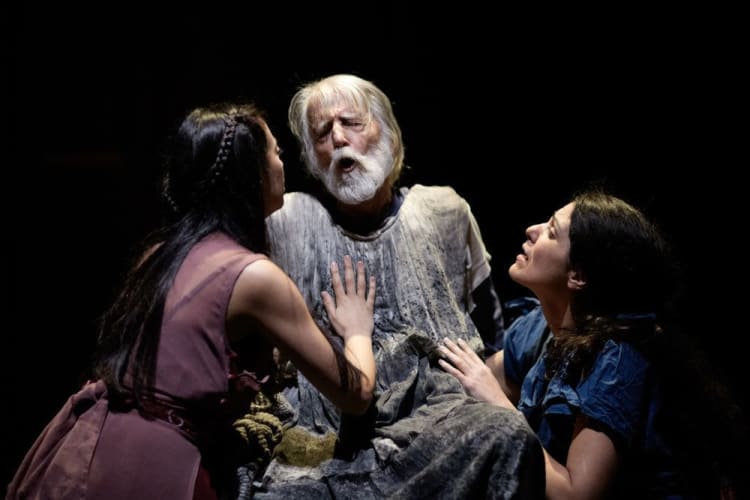George Eugeniou’s production for his Theatro Technis company gives an unusual opportunity to hear what some of Sophocles text may have sounded like when it was first performed at the Athens Dionysia 2410 years ago, for it mixes the English translation with passages in both modern and ancient Greek, with explanatory surtitles for those of us who are not able to understand it.
Though not a direct sequel to Oedipus the King, this play ends the story of Oedipus, the king whose parents had him exposed and left to die on the mountains outside Thebes because it was prophesied that he would kill his father and marry his mother but who survives to be reared in another kingdom and unknowingly fulfils his fate. Self-blinded after the suicide of his wife-mother and deposed, he has wandered from place to place led by his daughter Antigone. Now, at the sacred grove of the Eumenides, the avenging Furies whom the Athenians euphemistically dubbed the “Kindly Ones,” he seeks Athens’s protection to end his days.
George Eugeniou himself plays Oedipus and does so entirely in Greek but that is no barrier to feeling the passion and intensity with which he portrays this sightless old man, turned out of his country and seeking final sanctuary. He gives him physical frailty but is fired by enormous energy. Veteran Eugeniou makes Oedipus a truly tragic figure as the duplicitous brother-in-law and the son who have sent him into exile each try to curry his support. With soft words they invite his return, hoping to gain the gods’ support for their opposing sides in the battle between his two sons for the Theban throne, but this Oedipus cannot be fooled.
As director, Eugeniou keeps things simple and direct, suggesting the sacred grove with minimal greenery and fallen leaves and introducing the figures of the Eumenides as three silent figures visible only to the audience. He uses them to add a ritualistic element to the production. Eva Galambosi has dressed everyone in a loosely classical way; there are no gimmicks in this presentation. The three-man chorus (who all double other roles) play in golden masks. Their speech sometimes has music backing (composed by David Mantovani) and is partly sung and they are not characterised as the old men of the text, but these elements of stylisation blend well with the portrayal of the other characters, which reflects the naturalistic feel of Taylor’s translation.
Tania Batzoglou is an emotional Antigone with Nicoletta Procopiou as her younger sister Ismene. Michael McEvoy is an easygoing somewhat laid-back Creon, seemingly benevolent until he realises he is not going to get his own way. Manos Koutsis is a more agitated Polynices—he circles the stage with little motivation, unless to find some light—and as Theseus, the gold-laurel crowned Athenian king, Lucien Morgan gives a strong performance, though with some odd emphases which don’t match the sense. But I saw a first performance with no previews and, like the sometimes slow take up of cues given in a different language, things may become more polished as the run progresses.
